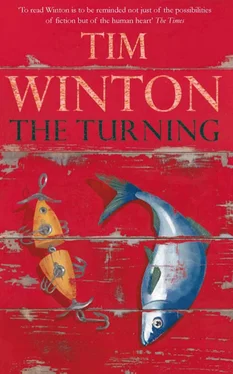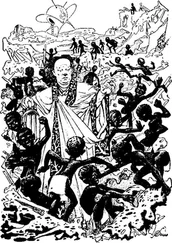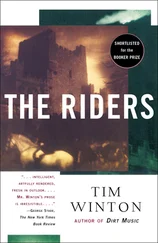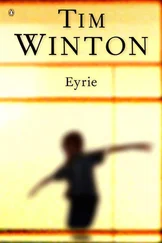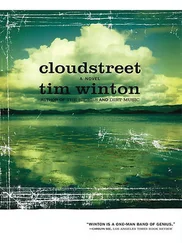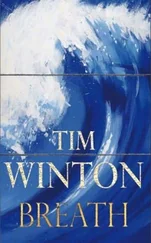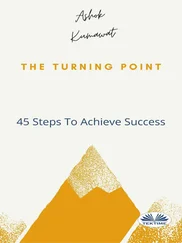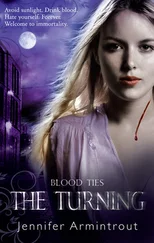Just his friend, I murmured.
Not from what I’ve heard.
I pressed my lips together and felt the heat in my face. I didn’t like him, didn’t trust him.
How’s his memory?
I don’t know, I said. Not too good, I think.
If he remembers, said the cop. If he wants to remember, will you tell me?
I licked my lips and glanced up the street.
I haven’t seen him, I said.
I go there and he just clams up. He doesn’t need to be afraid of me, he said. Not me. Tell him to give me the names.
I stepped away from the car.
I only need the other two, Jackie, he called. Just the two from out of town.
I walked away, kept on going. I felt him watching me all the way up the street.
Next day I hitched a ride out along the lowlands road to Boner’s place. I hadn’t been before and he’d never spoken of it directly though I’d pieced details together over the years as to where it was. I rode over in a pig truck whose driver seemed more interested in my bare legs than the road ahead. Out amongst the swampy coastal paddocks I got him to set me down where a doorless fridge marked a driveway.
I know you, he said, grinding the truck back into gear.
I don’t think so, I said climbing down.
I glanced up from the roadside and saw him sprawled across the wheel, chewing the inside of his cheek as he looked at me. The two-lane was empty. There wasn’t a farmhouse or human figure in sight. My heart began to jump. I did not walk away. I remembered how vulnerable I felt the day before in town in a street of passing cars and pedestrians while the cop watched my progress all the way uphill. I didn’t know what else to do but stand there. He looked in his mirror a moment and I stood there. He pulled away slowly and when he was a mile away I set off down the track.
A peppermint thicket obscured the house from the road. It was a weatherboard place set a long way back in the paddocks, surrounded by sheets of tin and lumber and ruined machinery. I saw a rooster but no dogs. I knew I had the right farm because I recognized the vehicles.
As I approached, an old man came out onto the sagging verandah in a singlet. He stood on the top step and scowled when I greeted him.
I was looking for Boner? I chirped.
Then you found him, he said, looking past me down the drive.
Oh, I stammered. I meant your son?
His name’s Gordon.
Um, is he home?
The old man jabbed a thumb sideways and went inside. I looked at the junkyard of vehicles and noticed a muddy path which took me uphill a way past open sheds stacked with spud crates and drums. Back at the edge of the paddock, where fences gave way to peppy scrub and dunes, there was a corrugated iron hut with a rough cement porch.
Boner was startled by my arrival at his open door. He got up from his chair and limped to the threshold. Behind him the single room was squalid and chaotic. There was an oxy set on the strewn floor and tools on the single bed. He seemed anxious about letting me in. I stepped back so he could hobble out onto the porch. In his hands was a long piece of steel with a bronzed spike at one end.
What’re you making? I said.
This, he said.
But what is it?
Shark-sticker.
You, you spear sharks?
He shrugged.
So how are you?
Orright.
Haven’t seen you for ages, I said.
Boner turned the spear in his hands.
I hitched out, I said.
He was barefoot. It was the first time I’d seen him without his Johnny Rebs. He had hammer toes. Against the frayed hems of his jeans his feet were pasty white. We stood there a long while until he leant the spear against the tin wall.
Wanna go fishin?
I didn’t know what to say. I lived in a harbour town all my life but I’d never had the slightest interest in fishing.
Okay, I said. Sure.
We drove out in the Valiant with two rods and a lard bucket full of tackle and bait. Boner had his boots on and a beanie pulled down over his ears. It took me a moment to see why he’d chosen the Valiant. He didn’t say so but it was obvious that, for the moment, driving anything with a clutch was beyond him.
Out on Thunder Beach we cast for salmon and even caught a few. We stood a few yards apart with the waves clumping up and back into the deep swirling gutters in a quiet that didn’t require talk. I watched and learnt and found to my surprise that I enjoyed the whole business. Nobody came by to disturb us. The white beach shimmered at our backs and the companionable silence between us lasted the whole drive back into town. I didn’t tell him about the cop. Nor did I ask him again about who bashed him. I didn’t want him to shut down again. I was content just to be there with him. It was as though we’d found new ground, a comfortable way of spending time together.
We saw each other off and on after that, mostly on weekends. These were always fishing trips; the aimless drives were behind us. We lit fires on the beach and fried whiting in a skillet. When his legs were good enough we’d climb around the headland at Massacre Point and float crab baits off the rocks for groper. If he got a big fish on, Boner capered about precariously in his slant-heeled boots, laughing like a troll. He never regained the truckin strut that caught my eye on the school verandah years before. Some days he could barely walk and there were times when he simply never showed up. I knew he was persecuted by headaches. His mood could swing wildly. But there were plenty of good times when I can picture him gimping along the beach with a bucket full of fish seeming almost blissful. No one was ever arrested over the beating. It didn’t seem to bother him and he didn’t want to talk about it.
I didn’t notice what people said about us in those days. I wasn’t even aware of the talk. I was absorbed in my own thoughts, caught up in the books I read, the plans I was making.
During the Christmas holiday in the city, I met a boy at the movies who walked me back the long way to the dreary motel my parents favoured, and kissed me there on the steps in the street. He came by the next morning and we took a bus to Scarborough Beach and when I got back that evening, sunburnt and salt-streaked, my parents were in a total funk.
The boy’s name was Charlie. He had shaggy blond surfer hair and puppy eyes and my father disliked him immediately. But I thought he was funny. Neither of us had cared much for The Great Gatsby. Charlie had a wicked line in Mia Farrow impersonations. He could get those eyes to widen and bulge and flap until he had me in stitches. In Kings Park I let him hold my breast in his hand and in the dark his smile was luminous.
The first time I saw Boner in the new year he was parked beside the steam cleaner at the Esso. The one-tonner’s tray was dripping and he sat low in his seat, the bill of his cap down on his nose. I knew he’d seen me coming but he seemed anxious and reluctant to greet me. A sedan pulled up beside him — just eased in between us — and the way Boner came to attention made me veer away across the tarmac and keep going.
The last year of school just blew by. I became a school prefect, won a History prize, featured as a vicious caricature in the lower school drama production (Mae West in a mortar board, more or less).
Boner taught me to drive on the backroads. We fished occasionally and he showed me the gamefishing chair he’d bolted to the tray of the Land Rover so he could cast for sharks at night. His hands shook sometimes and I wondered what pills they were that he had in those film canisters on the seat. I smoked a little dope with him and then didn’t see him for weeks at a time.
At second-term break Charlie arrived with some surfer mates in a Kombi. My mother watched me leave through the nylon lace curtains. As I showed Charlie and his two friends around town I sensed their contempt for the place. I apologized for it, smoked their weed and directed them out along the coast road. We cruised the beaches and got stoned and ended up at Boner’s place on the lowlands road. But nobody came out to meet us. In front of the main house stood the bloodstained one-tonner, its tray a sticky mess of spent rifle shells and flyblown hanks of bracken. When Charlie’s mates saw the gore-slick chainsaw they wanted out. We bounced back up the drive giggling with paranoia.
Читать дальше
